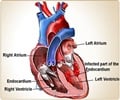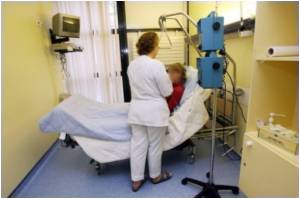
‘In stabilized patients with left-sided infectious endocarditis, a switch from intravenous to oral antibiotic therapy showed superior efficacy and safety compared with continued intravenous treatment. ’
Tweet it Now
People with pre-existing heart valve disease, previous endocarditis, prosthetic heart valves or other implanted cardiac devices have an elevated risk for infectious endocarditis. The condition most often occurs on the left side of the heart in the mitral or aortic valve. Men are diagnosed with infectious endocarditis about twice as often as women. The current study, known as POET, is the largest randomized trial of patients with infectious endocarditis, and was designed to test whether oral antibiotic therapy for left-sided infectious endocarditis was at least as effective and safe as intravenous treatment.
Clinical guidelines from several professional organizations currently recommend treating left-sided infectious endocarditis with intravenous antibiotics for up to six weeks. During the initial treatment phase, patients often need intensive care and close monitoring. Because intravenous antibiotics are logistically difficult to administer outside of a hospital, most patients remain in the hospital for the duration of their treatment.
Studies have suggested that intravenous treatment during long hospital stays may put patients at increased risk for complications. Oral antibiotics would allow patients to leave the hospital sooner and complete their treatment at home. Studies in other conditions have shown that patients with shorter hospital stays generally had better outcomes.
A total of 400 patients (average age 67 years; 77 percent male) with left-sided infectious endocarditis were enrolled in the study. Study participants had to be in stable condition and to have had a satisfactory response to at least 10 days of intravenous antibiotic treatment before randomization. They were then randomly assigned to either continue with intravenous antibiotics or switch to oral treatment for an average of 17 days after they were diagnosed. Intravenously-treated patients remained in the hospital until they completed antibiotic therapy. Patients who switched to oral treatment were discharged from the hospital a median of three days after making the switch.
Advertisement
After a median of 3.5 years of follow-up, 53 patients (26.4 percent) in the group receiving partial oral treatment had a primary-endpoint event, compared with 76 patients (38.2 percent) in the intravenously treated group, a statistically significant difference. Eighty-seven patients died; of these, 54 (27.1 percent) were treated intravenously and 33 (16.4 percent) were treated with oral medications, a significant difference. No significant differences in outcome were seen for relapse of infection, unplanned cardiac surgery or embolic events. The magnitude of the difference between the two groups is sufficient to conclude that oral treatment is superior to intravenous treatment, Bundgaard said.
Advertisement
Source-Eurekalert















